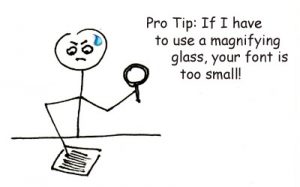
With the help of a good editor, the joke goes, Tolstoy could have gotten War and Peace down to just War. It’s true that, at least for business writing, we at ProofreadingPal usually aim to make things shorter. You might want your Russian historical novel to be a sweeping panorama, but when it comes to your résumé, as with your cover letter, the opposite is true. Remember, a recruiter spends only a moment scanning your résumé, looking for reasons to discard it. If she has to work too hard to find vital information, that’s reason enough to ding you.
Briefer is better.
Executive positions, medicine, and academia use the CV format, which goes into extensive detail. But if you’re applying for the kind of job that requires a résumé, you can probably get it onto a single page. We all like to think we’re the exception to the rule. I’ve seen college kids with no meaningful work experience spin five pages out of a couple of internships and a summer gig scooping ice cream, but let’s get real. You may attach an additional page for references or for a list of software or other proficiencies. But the essentials, the places and dates? You can get those done in one. Here’s how.
Get a free sample proofread and edit for your document.
Two professional proofreaders will proofread and edit your document.
Think in bullet points. In describing your employment history, don’t dwell on the details of a position; focus on its meaning. Looking at each of your previous jobs, summarize your duties in a single brief sentence, concentrating on the formula of what purpose you served and for whom.
For example, I once provided audio-visual services for a small college. The job entailed a host of duties, such as setting up projectors, managing a  video library, running sound for concerts, and videotaping events. Rather than enumerate all these duties in my résumé, though, I zeroed in on my overall role—keeping everything organized—and summarized the job in ten words: “Coordinated deployment of presentation equipment to enhance teaching and learning.”
video library, running sound for concerts, and videotaping events. Rather than enumerate all these duties in my résumé, though, I zeroed in on my overall role—keeping everything organized—and summarized the job in ten words: “Coordinated deployment of presentation equipment to enhance teaching and learning.”
Having summed up your position, draw up a list of career highlights, times when you took on responsibilities beyond the day-to-day duties of your job. This might include instituting new programs, cross-training in other departments, or serving on working groups. Don’t be humble! List every highlight you can think of, then rank them. The top three are your bullet points. Delete the rest. Repeat this process for each job.
Forget complete sentences. For each bullet point, follow the same process as you did for your general duties, reducing the highlight to a descriptive phrase of 8–16 words. Omit pronouns and articles. “I instituted a new training program for my student employees,” for instance, becomes, “Instituted new training program for student employees.”
Be consistent with structure. In expository writing, we vary sentence structure to keep our prose lively. In a list, each item follows the same pattern, making it easier to find the vital information. Here’s an example of inconsistent construction:
That last item breaks the pattern; it has no verb. It should read: “Drafted departmental budgets and performed bookkeeping duties.”
Choose action words. In our summaries and list items, we’re leading with the verb to emphasize accomplishments. Choose your verbs for maximum impact. Avoid weak or passive verbs like be or receive in favor of stronger, more descriptive verbs: Served as committee treasurer. Earned “Top Salesman” award.
Include quantifiables. Numbers and specifics add weight to any accomplishment. “Managed departmental budget” doesn’t tell us much. “Managed $1.2 million departmental budget” makes us sit up and take notice. How many people did you supervise? How many sales calls did you make? How many pizzas did you bake? How many servers did you maintain? You don’t have to quantify every item in your list, but a sprinkling of specifics makes your accomplishments real for your reader.
Bait the hook. When drafting a résumé, resist the temptation to over-explain. Keep in mind that your résumé is only one stage in a process that will lead to an interview. Your bullet points act like a table of contents. They don’t need to tell the story in themselves; their function is to entice the reader to read on. The résumé should raise as many questions as it answers, and the only way the recruiter will learn the whole story is to invite you to an interview.
Jack F.
Get a free sample proofread and edit for your document.
Two professional proofreaders will proofread and edit your document.
Get a free sample proofread and edit for your document.
Two professional proofreaders will proofread and edit your document.
We will get your free sample back in three to six hours!